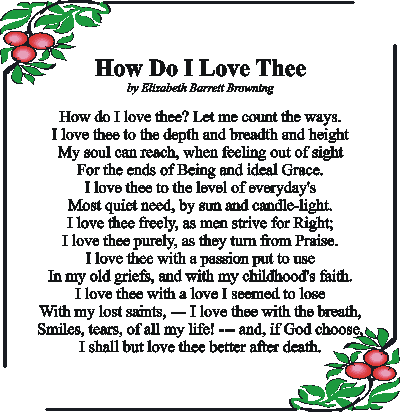“Change Upon Change” by Elizabeth Barrett Browning is a poem about love and how it changeslike the seasons. The tone of the poem begins light-hearted and shifts into sad and sarcastic. It is immediately prefaced with evidence of a change: “Five months ago the stream did flow” (ln 1). Five months ago, things were the way they should be. Love was flowing and things were happening in the way they are expected to.
“And we were lingering to and fro,
Where none will track thee in the snow,
Along the stream, beside the hedge.
Ah, Sweet, be free to love and go!” (ln 3-6)
This suggests that the speaker is happily in love (just as they should be) with no one else around to bother them. Their love is free to be where it needs to be and it is easy. At the beginning of a new relationship, no one else matters. A key component of the first six lines of the poem is that they are written in the past tense. This foreshadows the changes to come, not only with the seasons, but also with the relationship. Snow, or more precisely anything that represents winter, seems to represent the negative force that changes the love. Bad things happen in the cold or because of the cold.
The second half of the first Stanza refers again to the cold change in the seasons: “The frozen river is as mute,/The flowers have dried down to the root:” (ln8-9). Now that the river is frozen, there is no more sound. This represents the change in the relationship and possibly reflects a lack of communication. The flowers represent the love as well. Something that, in the summer season, was full of beauty and life is now, as winter approaches, dried up. The last two lines of the stanza contain a hint of bitterness, “And why, since these be changed since May,/Shouldst thou change less than they.”(ln 10-11) If something as natural as the seasons experience so many changes, why wouldn’t the relationship that once was so carefree and beautiful change too. There is a combination of bitterness and sarcasm in these last two lines. The speaker is upset with the change, yet not particularly surprised by it.
“And slow, slow as the winter snow
The tears have drifted to mine eyes;
And my poor cheeks, five months ago
Set blushing at thy praises so,” (ln12-15)
A solemn tone takes over the poem at this point. The winter snow is upon them and is described as being slow. The speakers “poor cheeks” were so happy 5 months before: receiving and accepting praises from her love, but slowly like the seasons changing, the tears have now been falling.The repetition in the phrases “Ah, Sweet, be free to love and go!” (ln 6) and “Ah, Sweet, be free to praise and go!” (ln 17) emphasizes the change in the relationship through the speaker’s voice. It is significant to recognize that the speaker refers to her love in the same way both times which suggests that her feelings are the same. In the beginning, the speaker talks of “love” and then a less personal “praise” when the relationship has gone bad. This repetition is important because it highlights the fact that the speaker’s feelings remain the same and therefore explains why there is sadness rather than anger. There is a significant shift in attitude from sincere love to having to put on a “disguise”. The change in season symbolizes the change in the relationship.
“For if my face is turned to pale,
It was thine oath that first did fail,
It was thy love proved false and frail,” (ln 18-20)
The rhyming of these three lines adds emphasis to the idea that the speaker is the victim of this love gone wrong. It is beautifully and clearly stated where the blame should be placed. The words flow nicely yet the meaning is negative. The speaker is putting the blame on her love. If she is not able to pretend any longer, it was her love’s fault.
The last two lines, “And why, since these be changed enow./ Should I change less than thou.” (ln 21-22) reflect the speaker coming to a resolution. The repetition of lines from the first stanza draws attention to the symbolism throughout the poem. The end of the first stanza argues that since nature has made so many changes, why wouldn’t the love of her partner change just as much. Similarly, the last two lines argue that since her partner has made so many changes, then it stands to reason that she can change as well. The theme of a love changing with the seasons is reinforced throughout “Change Upon Change”. The title itself reflects the idea of change happening upon other changes. This poem also demonstrates a universal theme about love and the progression it takes over the course of a relationship. Almost everyone can relate to the ease of the beginning of love and the harsh, but inevitable changes that occur as time goes on. Although written sometime around 1846, the theme of this poem still resonates with people today.
Some online learning platforms provide certifications, while others are designed to simply grow your skills in your personal and professional life. Including Masterclass and Coursera, here are our recommendations for the best online learning platforms you can sign up for today.
The 7 Best Online Learning Platforms of 2022
- Best Overall: Coursera
- Best for Niche Topics: Udemy
- Best for Creative Fields: Skillshare
- Best for Celebrity Lessons: MasterClass
- Best for STEM: EdX
- Best for Career Building: Udacity
- Best for Data Learning: Pluralsight















